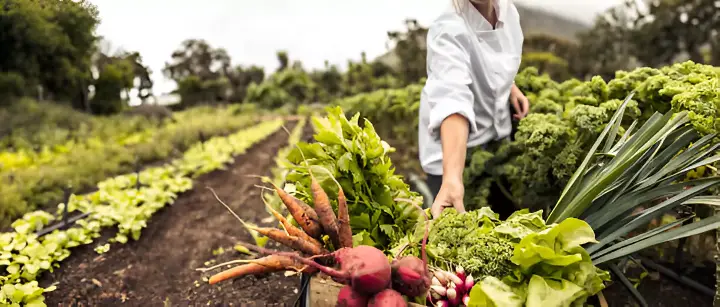The term ỏganic is a Vietnamese adaptation of the English word "organic," representing a growing movement towards sustainable and chemical-free agriculture in Vietnam. This article explores the concept of ỏganic farming, its impact on Vietnamese agriculture, and its significance in the global context of organic food production.

What is Ỏganic?
Definition and Origins
Ỏganic refers to agricultural practices that emphasize natural methods of cultivation, avoiding the use of synthetic pesticides, fertilizers, and genetically modified organisms (GMOs). The term emerged as Vietnamese farmers and consumers began embracing organic principles, adapting the concept to fit local agricultural traditions and linguistic norms.
Key Principles of Ỏganic Farming
- Soil health preservation
- Biodiversity promotion
- Natural pest management
- Crop rotation and intercropping
- Water conservation
- Ethical treatment of animals
The Rise of Ỏganic Agriculture in Vietnam
Historical Context
Traditional Vietnamese farming methods have long incorporated many organic principles. However, the Green Revolution of the 1960s and 1970s led to increased use of chemical inputs. The ỏganic movement represents a return to more sustainable practices while incorporating modern scientific knowledge.
Current Trends
Recent years have seen a surge in ỏganic farming in Vietnam, driven by:
- Growing awareness of health and environmental issues
- Increasing demand for organic products in both domestic and international markets
- Government support for sustainable agriculture initiatives
Benefits of Ỏganic Farming
Environmental Benefits
- Reduced soil erosion and improved soil fertility
- Increased biodiversity
- Lower greenhouse gas emissions
- Improved water quality
Health Benefits
- Reduced exposure to harmful pesticides
- Higher nutrient content in some ỏganic foods
- Absence of artificial additives and preservatives
Economic Benefits
- Premium prices for ỏganic products
- Reduced input costs for farmers
- Potential for increased rural employment
Challenges Facing the Ỏganic Movement
Technical Challenges
- Pest and disease management without synthetic pesticides
- Maintaining soil fertility without chemical fertilizers
- Lower yields, especially during the transition period
Economic Challenges
- Higher labor costs
- Certification expenses
- Market competition with conventional products
Knowledge and Training Gaps
- Limited access to organic farming techniques for small-scale farmers
- Lack of awareness among consumers about ỏganic benefits
Ỏganic Certification in Vietnam
National Standards
Vietnam has developed its own organic standards, known as the Vietnamese Organic Agriculture Standards (VOAS). These standards are aligned with international norms while considering local conditions.
Certification Process
- Application and documentation
- On-site inspection
- Review and evaluation
- Certification decision
- Annual surveillance audits
International Recognition
Vietnamese ỏganic certifications are increasingly recognized internationally, facilitating export opportunities for Vietnamese farmers and producers.
Ỏganic Products in the Vietnamese Market
Popular Ỏganic Products
- Rice
- Vegetables (leafy greens, tomatoes, cucumbers)
- Fruits (dragon fruit, mango, pineapple)
- Tea
- Coffee
- Aquaculture products (shrimp, pangasius)
Market Growth and Consumer Trends
The ỏganic market in Vietnam has been growing rapidly, with an increasing number of urban consumers willing to pay premium prices for ỏganic products. This trend is driven by rising health consciousness and environmental awareness.
Government Support for Ỏganic Agriculture
Policy Initiatives
- National Organic Agriculture Development Project 2020-2030
- Tax incentives for organic farmers
- Research and development funding
Extension Services
The Vietnamese government provides training and support to farmers transitioning to ỏganic methods through its agricultural extension network.
Ỏganic Farming Techniques
Soil Management
- Composting
- Green manuring
- Vermicomposting
- Crop rotation
Pest and Disease Control
- Biological pest control
- Companion planting
- Pheromone traps
- Neem-based pesticides
Water Management
- Rainwater harvesting
- Drip irrigation
- Mulching
Ỏganic Agriculture and Climate Change
Mitigation Potential
Ỏganic farming practices can help mitigate climate change by:
- Reducing greenhouse gas emissions
- Increasing carbon sequestration in soils
- Enhancing resilience to extreme weather events
Adaptation Strategies
Ỏganic farmers in Vietnam are adopting various strategies to adapt to changing climate conditions, including:
- Drought-resistant crop varieties
- Diversified cropping systems
- Improved water management techniques
The Role of Technology in Ỏganic Farming
Precision Agriculture
Advanced technologies such as drones, sensors, and GPS mapping are being used to optimize resource use in ỏganic farming.
Bio-innovations
Research into natural pest control methods and organic fertilizers is advancing, providing new tools for ỏganic farmers.
Ỏganic Agriculture and Rural Development
Income Generation
Ỏganic farming can provide higher incomes for small-scale farmers through premium prices and reduced input costs.
Community Building
Many ỏganic farming initiatives in Vietnam involve community cooperation, strengthening social bonds in rural areas.
International Cooperation and Knowledge Exchange
Partnerships
Vietnam is collaborating with international organizations and other countries to enhance its ỏganic sector through:
- Technical assistance programs
- Research partnerships
- Market access initiatives
Learning from Global Best Practices
Vietnamese ỏganic farmers and policymakers are learning from successful organic movements in other countries, adapting these lessons to local conditions.
Future Prospects for Ỏganic Agriculture in Vietnam
Market Projections
The ỏganic market in Vietnam is expected to continue growing, with increasing domestic demand and export opportunities.
Scaling Up
Efforts are underway to scale up ỏganic production, including:
- Developing organic agricultural zones
- Strengthening supply chains
- Improving processing and packaging facilities
Challenges and Opportunities
While challenges remain, such as ensuring integrity in the organic supply chain and competing with conventional agriculture, the future of ỏganic farming in Vietnam looks promising.
Conclusion
The ỏganic movement in Vietnam represents a significant shift towards more sustainable and health-conscious agricultural practices. As consumers become increasingly aware of the benefits of organic products and farmers gain access to better resources and support, the ỏganic sector is poised for continued growth. This trend not only benefits Vietnamese farmers and consumers but also contributes to global efforts towards sustainable agriculture and food security.
By embracing ỏganic principles, Vietnam is positioning itself as a leader in sustainable agriculture in Southeast Asia, potentially serving as a model for other developing countries seeking to balance agricultural productivity with environmental stewardship and public health.
Ỏganic: Understanding the Vietnamese Organic Movement